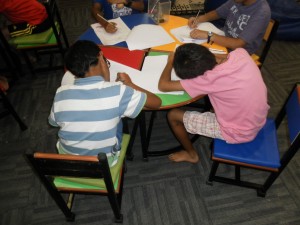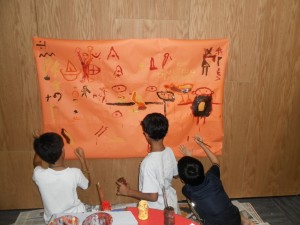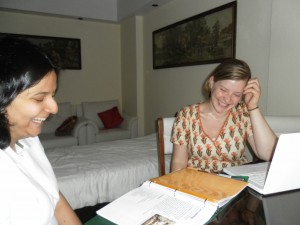 Delivering and demonstrating unambiguous benefits — cognitive, social and emotional, physical, etc — had been our emphatic charge since way back when. But today our boss declared that she’d figured out what was missing: fun.
Delivering and demonstrating unambiguous benefits — cognitive, social and emotional, physical, etc — had been our emphatic charge since way back when. But today our boss declared that she’d figured out what was missing: fun.
“Oh,” said Emily and I, turning to each other and nodding. “That shouldn’t be a problem.”
In the morning with the younger children:
I welcomed some girls’ entry into the block area, encouraging them as they delightedly built complex towers. We read the kids’ wiggles and switched up our schedule, seguing from Arrival straight into Snack, singing them the silly Name Game to their giggly delight. We kicked off Meeting with “Jambo,” and they leapt from carpet, one by one, to show off their jumping skills as we sang them hello in Swahili…
At lunchtime, we teachers made a beeline for Colaba Causeway, managing to add a few more garments to our meager wardrobes, grab a quick bite in a cafe, and make it back to work in time for the second shift. Success! THAT’s how you maximize three hours.
In the evening with the older children:
We laughed and joked more than we ever had, for each day we keep getting to know one another better. I shared with one information-appreciative child a math cheer I learned back in junior high (“Secant, tangent, cosine, sine, 3.14159!”). Running ahead of schedule, we cooked up an activity on the fly, incorporating our art detective ways into a version of hit improv game “What are you doing?”
In the morning, when I asked children at Wrap-up about their favorite part of the day, several children enthused “everything!” In the afternoon, when I mentioned that the week’s workshop was more than half over, a sweet-natured boy observed, “Time goes fast.”
Prior to our workday, Emily and I had stopped at Cafe Coffee Day rather than wait until the coffee/chai-wallah brought us a beverage mid-morning. After our workday, Emily and I took on the town — first time we’d done that, first time our bodies felt equal to the task. We climbed into a cab we had flagged down ourselves, rumbled down to the Woodside Inn, and sipped on a coconut mango martini (me) and Indian white wine (Emily). Before returning to our abode, we bargained on the street for a few shirts whose price, at last, was closer to the “dirt cheap” description we’d been anticipating all along.
Cumulatively, I’m not sure if all of this represents stepping out of our comfort zone or stepping back in. At heart, all of these activities better represent me than their alternative:
I am a silly singer who digs a good improv game — playing it serious and schooling with a straight face just isn’t my style;
I am one to jam several activities into a too-short day — taking in a two-hour lunch and skipping out on the scenery doesn’t sit right; and
I am an adult well-accustomed to independence and personal negotiation — letting someone else dictate my itinerary and speak on my behalf is altogether foreign.
In escaping the routine we’d somewhat established during this first week in India, we actually returned to our old ways.
Welcome home.




